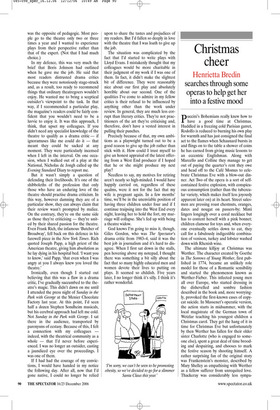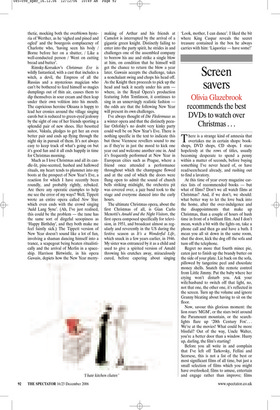Christmas cheer
Henrietta Bredin searches through some operas to help get her into a festive mood
Puccini’s Bohemians really knew how to have a good time at Christmas. Huddled in a freezing cold Parisian garret, Rodolfo is reduced to burning his own play for warmth and has just consigned the final act to the flames when Schaunard bursts in and flings on to the table a shower of coins he has earned from giving music lessons to an eccentric Englishman. Along with Marcello and Colline they manage to get out of paying the quarter’s rent they owe and head off to the Café Momus to celebrate Christmas Eve with a blow-out dinner. Act Two of the opera is a sort of selfcontained festive explosion, with conspicuous consumption (rather than the tubercular variety, which makes itself less joyously apparent later on) at its heart. Street salesmen are pressing roast chestnuts, oranges, dates and nougat on passers-by; Mimì lingers longingly over a coral necklace but has to content herself with a pink bonnet; children clamour for toys and, when everyone eventually settles down to eat, they call for a fabulously indigestible combination of venison, turkey and lobster washed down with Rhenish wine.
The ultimate killjoy at Christmas was Werther. The character created by Goethe in The Sorrows of Young Werther, first published in 1774, became an unlikely role model for those of a Romantic sensibility and started the phenomenon known as Werther-Fieber. This infected young men all over Europe, who started dressing in the dishevelled and sombre fashion described in the book and, more worryingly, provoked the first-known cases of copycat suicide. In Massenet’s operatic version, the action starts in midsummer, with the local magistrate of the German town of Wetzlar teaching his youngest children a Christmas carol. They get the hang of it in time for Christmas Eve but unfortunately by then Werther has fallen for their older sister Charlotte (who is engaged to someone else), spent a great deal of time brooding and despairing, and chooses to mark the festive season by shooting himself. A rather surprising fan of the original story was Frankenstein’s monster, described by Mary Shelley as empathising with Werther as a fellow sufferer from unrequited love. Thackeray was considerably less sympa thetic, mocking both the overblown hysteria of Werther, as he ‘sighed and pined and ogled’ and the bourgeois complacency of Charlotte who, ‘having seen his body / Borne before her on a shutter, / Like a well-conducted person / Went on cutting bread and butter’.
Rimsky-Korsakov’s Christmas Eve is wildly fantastical, with a cast that includes a witch, a devil, the Empress of all the Russias and a mysterious magician who can’t be bothered to feed himself so magics dumplings out of thin air, causes them to dip themselves in sour cream and then leap under their own volition into his mouth. The capricious heroine Oksana is happy to lead her cronies around the village singing carols but is reduced to green-eyed jealousy by the sight of one of her friends sporting a splendid pair of new shoes. Her besotted suitor, Vakula, pledges to get her an even better pair and ends up flying through the night sky in pursuit of them. It’s not always easy to keep track of what’s going on but it’s good fun and it all ends happily in time for Christmas morning.
Much as I love Christmas and all its candle-lit, pine-scented, hushed and hallowed rituals, my heart tends to plummet into my boots at the prospect of New Year’s Eve, a reaction for which I have recently been roundly, and probably rightly, rebuked. Are there any operatic examples to help me see the error of my ways? Well, Tippett wrote an entire opera called New Year, which even ends with the crowd singing ‘Auld Lang Syne’. (Ah, I’ve just realised, this could be the problem — the tune has the same sort of dirgeful scoopiness as ‘Happy Birthday’, and they both make me feel faintly sick.) The Tippett version of New Year doesn’t sound like a lot of fun, involving a shaman dancing himself into a trance, a scapegoat being beaten ritualistically and the arrival of Merlin in a spaceship. Harrison Birtwistle, in his opera Gawain, depicts how the New Year merry making of Arthur and his friends at Camelot is interrupted by the arrival of a gigantic green knight. Distinctly failing to enter into the party spirit, he strides in and challenges one of the assembled company to borrow his axe and strike a single blow at him, on condition that he himself will get the chance to return the blow a year later. Gawain accepts the challenge, takes a nonchalant swing and chops his head off. As the Knight then proceeds to pick up the head and tuck it neatly under his arm where, in the Royal Opera’s production featuring John Tomlinson, it continues to sing in an unnervingly realistic fashion the odds are that the following New Year will present its own challenges.
I’ve always thought of Die Fledermaus as a winter opera and that the distinctly peculiar Orlofsky’s no doubt very kinky party could well be on New Year’s Eve. There is nothing specific in the text to indicate this but those Viennese revellers sound to me as if they’re in just the mood to kick one year out and welcome another one in. And it’s frequently performed at New Year in European cities such as Prague, where a friend once attended a performance throughout which the champagne flowed and at the end of which the doors were flung open to admit the sound of church bells striking midnight, the orchestra pit was covered over, a jazz band took to the stage and everyone danced into the early hours.
The ultimate Christmas opera, about the first Christmas of all, is Gian Carlo Menotti’s Amahl and the Night Visitors, the first opera composed specifically for television, in 1951, and broadcast almost as regularly and reverently in the US during the festive season as It’s a Wonderful Life, which snuck in a few years earlier, in 1946. My sister was entranced by it as a child and used to give a spirited version of Amahl throwing his crutches away, miraculously cured, before capering about singing ‘Look, mother, I can dance’. I liked the bit where King Caspar reveals the secret treasure contained in the box he always carries with him: ‘Liquorice — have some!’







































































































































 Previous page
Previous page